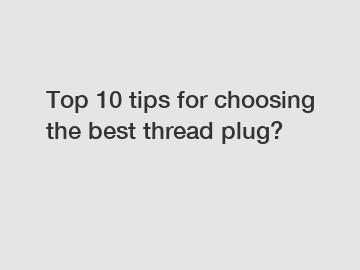Top 10 tips for choosing the best thread plug?
Top 10 tips for choosing the best thread plug .
Choosing the best thread plug is crucial for ensuring the quality and durability of mechanical components. Here are the top 10 tips to consider when selecting the right thread plug for your needs. .
1. Consider the thread type: Before buying a thread plug, it is important to determine the type of thread you are working with. Whether it is metric, imperial, or special thread, make sure to choose a plug that matches the thread type precisely. .

2. Check the material: The material of the thread plug can greatly impact its performance and longevity. Opt for high-quality materials such as steel or carbide to ensure durability and resistance to wear and tear. .
3. Verify the tolerance class: Tolerance class specifies the level of precision and accuracy of the thread plug. Choose a plug with the appropriate tolerance class to ensure a perfect fit and smooth operation. .
4. Consider the thread pitch: The pitch of the thread is crucial for determining the spacing between individual threads. Be sure to choose a thread plug with the correct pitch to avoid any compatibility issues. .
5. Evaluate the coating: Coatings such as chrome or titanium nitride can enhance the performance and longevity of the thread plug. Consider plugs with these coatings for added protection against corrosion and abrasion. .
6. Check the size range: Make sure to select a thread plug that covers the entire range of sizes required for your project. Choosing a plug with a limited size range may result in compatibility issues or inefficiencies. .
7. Review the thread engagement: The thread engagement refers to the depth of the thread in the hole. Ensure that the thread plug provides sufficient engagement to avoid stripping or loosening of the thread. .
8. Consider the application: Different thread plugs are designed for specific applications, such as automotive, aerospace, or plumbing. Choose a plug that is tailored to your industry or project requirements for optimal performance. .
9. Inspect the calibration: Before purchasing a thread plug, make sure to verify its calibration and accuracy. A calibrated plug will provide consistent and reliable results, saving you time and effort in the long run. .
10. Seek recommendations: Finally, consider seeking recommendations from professionals or colleagues who have experience in using thread plugs. Their insights and advice can help you make an informed decision and choose the best plug for your specific needs. .
In conclusion, selecting the best thread plug involves thorough consideration of various factors such as thread type, material, tolerance class, and application. By following these top 10 tips, you can ensure that you choose a high-quality plug that meets your requirements and delivers excellent performance in your projects.
If you want to learn more, please visit our website pipe caps manufacturer, steel flanges wholesale, cu-ni pipe fittings.
190
0
0

Comments
All Comments (0)